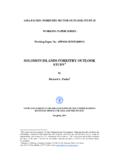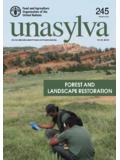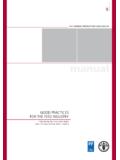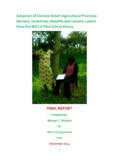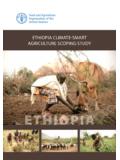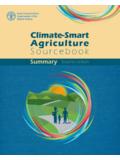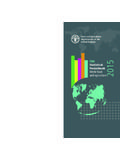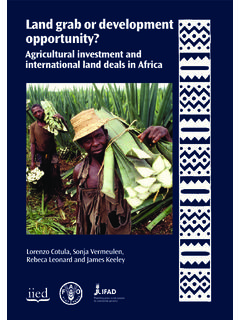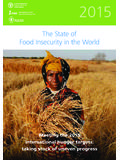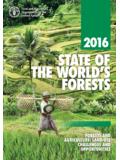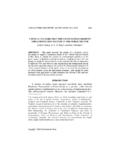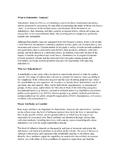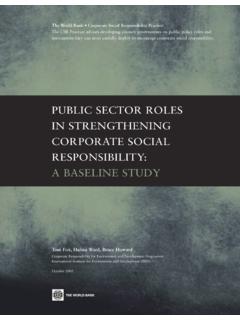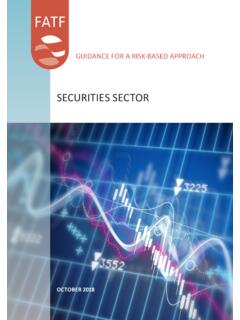Transcription of Voluntary Standards for Sustainable Food Systems ...
1 Voluntary Standards for Sustainable food Systems : challenges and Opportunities A Workshop of the FAO/UNEP. Programme on Sustainable food Systems Voluntary Standards for Sustainable food Systems : challenges and Opportunities A Workshop of the FAO/UNEP. Programme on Sustainable food Systems 11 12 June 2013. FAO headquarters, Rome Edited by Alexandre Meybeck and Suzanne Redfern food AND AGRICULTURE ORGANIZATION OF THE UNITED NATIONS. UNITED NATIONS ENVIRONMENT PROGRAMME. Rome, 2014. Photo credits from left to right clockwise: Suzanne Redfern, Marzio Marzot, Marco Salustro, Marzio Marzot The designations employed and the presentation of material in this information product do not imply the expression of any opinion whatsoever on the part of the food and Agriculture Organization of the United Nations (FAO) or the United Nations Environment Programme (UNEP) concerning the legal or development status of any country, territory, city or area or of its authorities, or concerning the delimitation of its frontiers or boundaries.
2 The mention of specific companies or products of manufacturers, whether or not these have been patented, does not imply that these have been endorsed or recommended by FAO or UNEP in preference to others of a similar nature that are not mentioned. The views expressed in this information product are those of the authors and do not necessarily reflect the views of FAO or UNEP. ISBN 978-92-5-107902-7 (print). E-ISBN 978-92-5-107903-4 (PDF). FAO, 2014. FAO encourages the use, reproduction and dissemination of material in this information product.
3 Except where otherwise indicated, material may be copied, downloaded and printed for private study, research and teaching purposes, or for use in non-commercial products or services, provided that appropriate acknowledgement of FAO as the source and copyright holder is given and that FAO's endorsement of users' views, products or services is not implied in any way. All requests for translation and adaptation rights, and for resale and other commercial use rights should be made via or addressed to FAO information products are available on the FAO website ( ) and can be purchased through Contents Acknowledgements v Agenda 1.
4 Summary report and main conclusions 5. Opening remarks 9. Ren Wang PAPERS PRESENTED. Nexus between public and private food Standards : main issues and perspectives 11. Pilar Santacoloma Objectives and challenges of the United Nations Forum on Sustainability Standards the emerging Intergovernmental Forum of Dialogue on Voluntary Sustainability Standards , a joint initiative of FAO, ITC, UNCTAD, UNEP and UNIDO 25. Frank Grothaus Lessons from the past and the emergence of international guidelines on sustainability of assessment of food and agriculture Systems 33.
5 Nadia El-Hage Scialabba Common metrics of Sustainable food Systems : issues and current developments in the livestock sector, with reference to the Livestock Environmental Assessment and Performance (LEAP) partnership 41. Pierre Gerber, F lix Teillard and Alison Watson Lessons learned from field projects on Voluntary Standards : synthesis of results 45. Allison Loconto and Pilar Santacoloma Stories behind quality labels around the Mediterranean countries 65. Annarita Antonelli, Lina Al-Bitar and Patrizia Pugliese Voluntary Standards : impacting smallholders' market participation 77.
6 Allison Loconto Geographical indication as a tool for Sustainable food Systems : importance of a territorial approach 93. Emilie Vandecandelaere iii FAO's strategic vision to engage with the private sector 105. Annamaria Pastore Development and use of FAO guidelines of ecolabelling of fish and aquaculture certification 121. Iddya Karunasagar Survey on (private) Voluntary Standards in the livestock sector 127. Irene Hoffmann, Roswitha Baumung and Claire Wandro Sustainable nutrition and consumer communication 143. Anne Roulin PDOs' role in reassuring consumers: the Parmigiano Reggiano Terremotato case 151.
7 Corrado Finardi and Davide Menozzi Signs to choose: Voluntary Standards and ecolabels as information tools for consumers 171. Alexandre Meybeck and Vincent Gitz Role of Voluntary sustainability Standards in South South food commodity supply chains: the case of the Sustainable rice platform 187. Wyn Ellis, James Lomax and Bas Bouman Ongoing experiences in Costa Rica: the Ecological Blue Flag Program 201. Roberto Azofeifa Voluntary Standards for Sustainable food Systems : the role of public procurement 205. Norma Tregurtha and Marcus Nyman Roles of public actors in the Voluntary Standards 215.
8 FAO food Control and Consumer Protection Group iv Acknowledgements The joint FAO/UNEP Workshop on Voluntary Standards for Sustainable food Systems : challenges and Opportunities was organized by the Sustainable food Systems Programme and held on 10 11 June 2013 at FAO headquarters in Rome, Italy. We would like to extend our special thanks to all the participants for their contributions and papers. Our appreciation is also expressed to the organizers of this Workshop Fanny Demassieux, James Lomax, Alexandre Meybeck, Suzanne Redfern, Pilar Santacoloma, Allison Loconto, Irene Hoffmann, Sandro Dernini and Maryam Rezaei.
9 Particular thanks are extended to Ren Wang, FAO Assistant Director- General. In addition, we are grateful to the Swiss Federal Office of Agriculture for their generous support in the preparation of this document. v Agenda The FAO/UNEP joint programme is catalysing partnerships among United Nations agencies, other international agencies, governments, industry and civil society whose activities, together, can promote the necessary transition to sustainability. An Agri- food Task Force (ATF) on Sustainable Consumption and Production (SCP) has been established, comprised of representatives of Member States, United Nations agencies, the private sector and civil society, and clusters of activities are being designed in response to stakeholders' stated needs.
10 In order to provide the members of the ATF with information for preparing the work of the various activity clusters, the FAO-UNEP Programme is organizing workshops on various technical issues. As a topic in relation with all the activity clusters, a first workshop on Voluntary Standards for sustainability (VSS) will be organized on 10 11 June 2013 (one day and half), in the Iran room, at FAO headquarters, Rome. The aim of the workshop is to examine various types of Standards and labels and to build upon lessons learned from concrete examples to identify issues and challenges to be addressed, discuss their potential contribution to improve sustainability of food Systems , and propose measures in order to improve their effectiveness.
